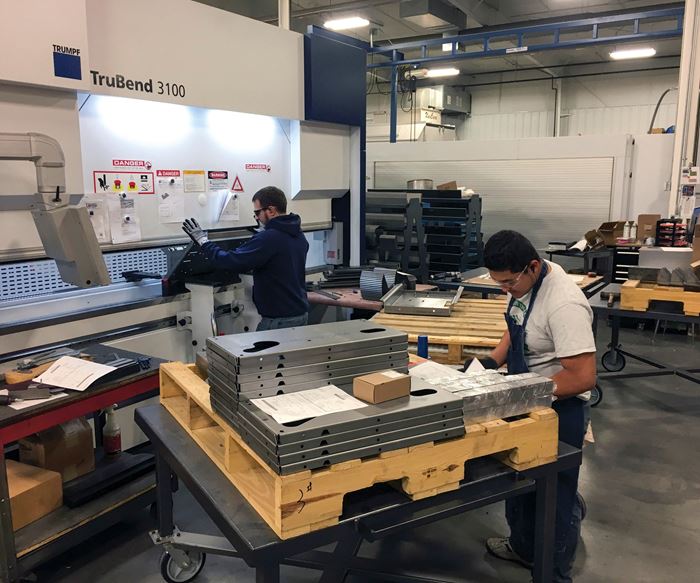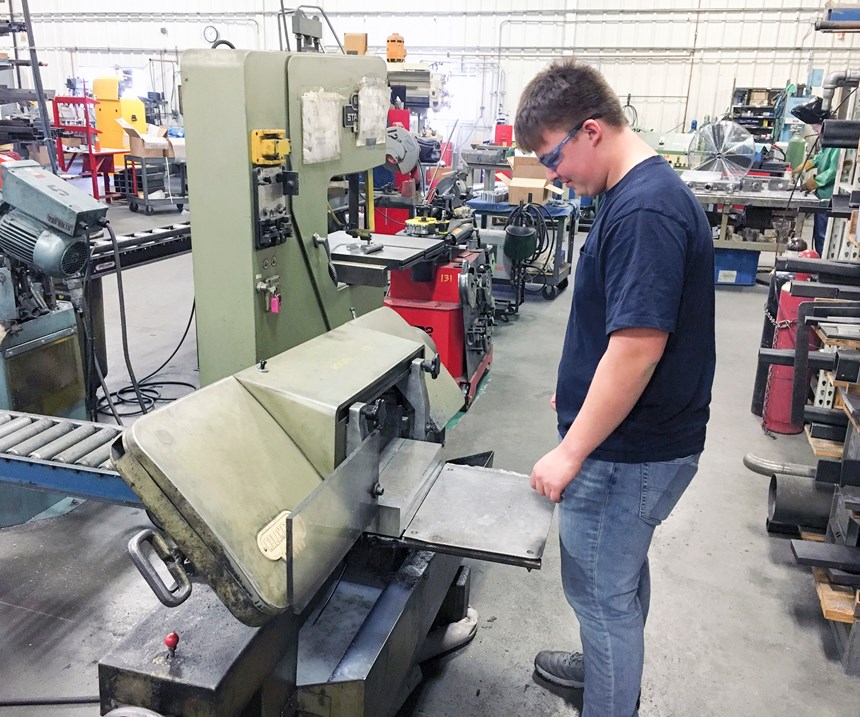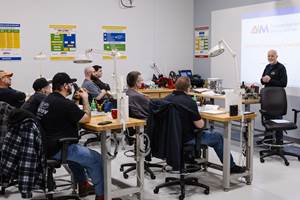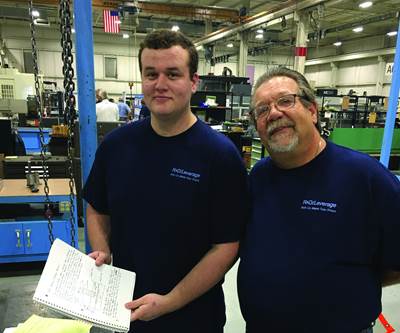Career Pathways in High School Produce Better-Prepared Workforce
Several mold manufacturing companies have shared how their workforce development strategies have evolved to meet the needs of today’s industry. Here, Dramco Tool talks about transitioning young workers from a school culture to a shop culture.
Apprenticeships work a little differently in Grand Island Nebraska, the location of Dramco Tool Co. Larry Patten is an owner of Dramco, which specializes in building dies and injection and compression molds with capacities ranging to 1,000 tons. The company has a 37,000-square-foot facility and employs 45 workers, three of whom were recently hired out of a local community college. “We have never had a formal apprenticeship program at Dramco,” Patten says. “A number of years ago, we started to focus on hiring students from a two-year technical college program to work part-time in the shop. We offered them the possibility of full-time employment after they had taken the required courses and graduated.”
In the past, Dramco typically hired about 90 percent of its employees after they had graduated with advanced, technical manufacturing degrees. The new hires came out of community college having learned basic machining skills, Patten says, and they had learned how to build and run a basic mold. That recruitment scenario has changed in recent years.
In 2009, Dramco became part of a task force that would ultimately develop Nebraska’s first Career Pathways Institute (CPI), which is geared toward providing career and technical training for students in the Grand Island Public School District and surrounding rural districts. Patten says that it took four years for the CPI to open its doors (it occupies a 66,000-square-foot manufacturing plant formerly owned by Pentair). The opening of the CPI provided new opportunities for Dramco to recruit students at a younger age. This is because high school juniors and seniors gain exposure to manufacturing skills via the Skilled and Technical Sciences pathway, which is one of 10 career pathways that the program offers. Budding machinists, tool and die makers, engineers and others learn entry-level job skills in an industrial setting that sets them on a pathway for success in their chosen career or prepares them for continuing education opportunities like college. They learn about manual mills and lathes, machine tools, CNC machining, surface grinders, welding and more using the latest equipment from companies like Haas Automation (Oxnard, California) and metalworking-machine supplier Productivity Inc. (Omaha, Nebraska). Guest speakers, facility tours and hands-on activities help to round out the curriculum. “Since our Career Pathways Institute opened, at least four more have opened across Nebraska that operate in a similar way,” Patten says.
“Instead of working only with high school graduates through the community college programs, we’re now starting sooner with high school juniors,” Patten says. “We bring them into our shop during the summer and after school to work part-time. It is important to get our prospects incorporated into the shop culture. They establish relationships with the current employees and become a part of the Dramco Team, which eases the transition from school culture to work culture. In turn, they can put some of the new skills they learn with us to use in the CPI program while they are still in school.”
It is important to get our prospects incorporated into the shop culture. They establish relationships with the current employees and become a part of the Dramco Team, which eases the transition from school culture to work culture.
Upon graduating high school, the students go directly into the community college program. They have already earned the first semester credit because of their participation with the Career Pathways Institute. While there is no guarantee of full-time employment, Patten says that during the remaining 1.5 years at the college, Dramco still brings apprentices in to work part-time. “We will typically have three to five apprentices working here at any given time, doing work that ranges from keeping the shop clean to doing basic CNC machine work. It gives us the opportunity to choose who we want to hire at the end based on 3.5 years of experience that we have working with them in our shop,” he says.
Dramco works with the instructors at the college (one of whom is a former employee who wanted to teach) when they are looking for new talent or when the school needs some assistance. For example, Patten and his partners visit CPI from time to time to interact with the instructors and the students. Dramco employees answered the call for help with a specific area of programming or machining, and the company has helped with building small tools or shop equipment that the school needed. “We also serve on the advisory boards of both CPI and Central Community College (CCC) to give advice on curriculum and program focus,” Patten says. “When a program like this is tuned in to the needs of the industry, it helps companies like Dramco to be very successful.”
When a program like this is tuned in to the needs of the industry, it helps companies like Dramco to be very successful.
Last November, the State of Nebraska implemented an apprenticeship policy that allows apprentices as young as 16 or 17 to perform basic machining like grinding, deburring and some milling work while learning a trade. Previously, the law required younger employees to wait until they were 18. Patten says that this affords his company the chance to teach apprentices not only basic machining, but the value of working efficiently and what it takes to complete a job on time. “We’re selling time, so it is critical that a new employee understands that it makes a big difference on the profit side if he or she finishes a job in a half-hour versus an hour. That’s a concept that individuals don’t always get,” he says.
Dramco has a scholarship program designed to help students as they go through their apprenticeships. “We budget annually for several $500-scholarship awards, some of which are awarded through the high-school CPI program,” Patten says. “We also work directly through the community college, letting them know that we have scholarships available, and the will send us candidates. Other times, those who are working for us part-time will get scholarship help.”
Apprentices who graduate and are hired full-time at Dramco spend the first year further honing their skills based on the company’s tiered work system. Patten says that there are three designated tiers of toolmakers ranging from entry level to lead toolmaker. Each tier lists the skills and recommended tools required to excel at that tier. For example, a Tier 2 toolmaker hired right out of school can begin working with a lead toolmaker straightaway. “We try to tailor each employee’s position within the company to his or her personality and skill set. We are finding that most employees that we hire out of school have rendered our Tier 1 classification useless since they are starting with skills required for Tier 2. The jump to Tier 3 is focused on better decision making and skills that are learned from experience as opposed to what might be termed as basic toolmaking skills. Our goal is to challenge every employee according to his or her individual capabilities. Working with these new programs has resulted in fast-tracking our new employees into productive employees sooner than in the past,” Patten says.
Related Content
Tackling a Mold Designer Shortage
Survey findings reveal a shortage of skilled mold designers and engineers in the moldmaking community, calling for intervention through educational programs and exploration of training alternatives while seeking input from those who have addressed the issue successfully.
Read MoreHands-on Workshop Teaches Mold Maintenance Process
Intensive workshop teaches the process of mold maintenance to help put an end to the firefighting culture of many toolrooms.
Read MoreMMT Chats: Championing Moldmaking Recruitment
Production manager is doing his part to help transform skilled trades recruitment through strategic advocacy and digital engagement.
Read MoreMold Maintenance Continues to Matter: Enhanced Training Program in a New Facility
I attended a MoldTrax mold maintenance workshop in 2019 and shared my experiences, and despite changes in ownership, the workshop's remarkable value endures, as discussed in a recent Q&A with the current leadership.
Read MoreRead Next
In-House Training Fosters Future Moldmaking Industry Leaders
R&D/Leverage shares its workforce development strategies, which include structured, hands-on training and a little old-fashioned work ethic.
Read MoreHow to Use Strategic Planning Tools, Data to Manage the Human Side of Business
Q&A with Marion Wells, MMT EAB member and founder of Human Asset Management.
Read MoreYour Guide to Smarter, Faster Mold Design
Dive into expert-curated content delivering proven solutions for mold optimization, manufacturability and precision performance.
Read More























